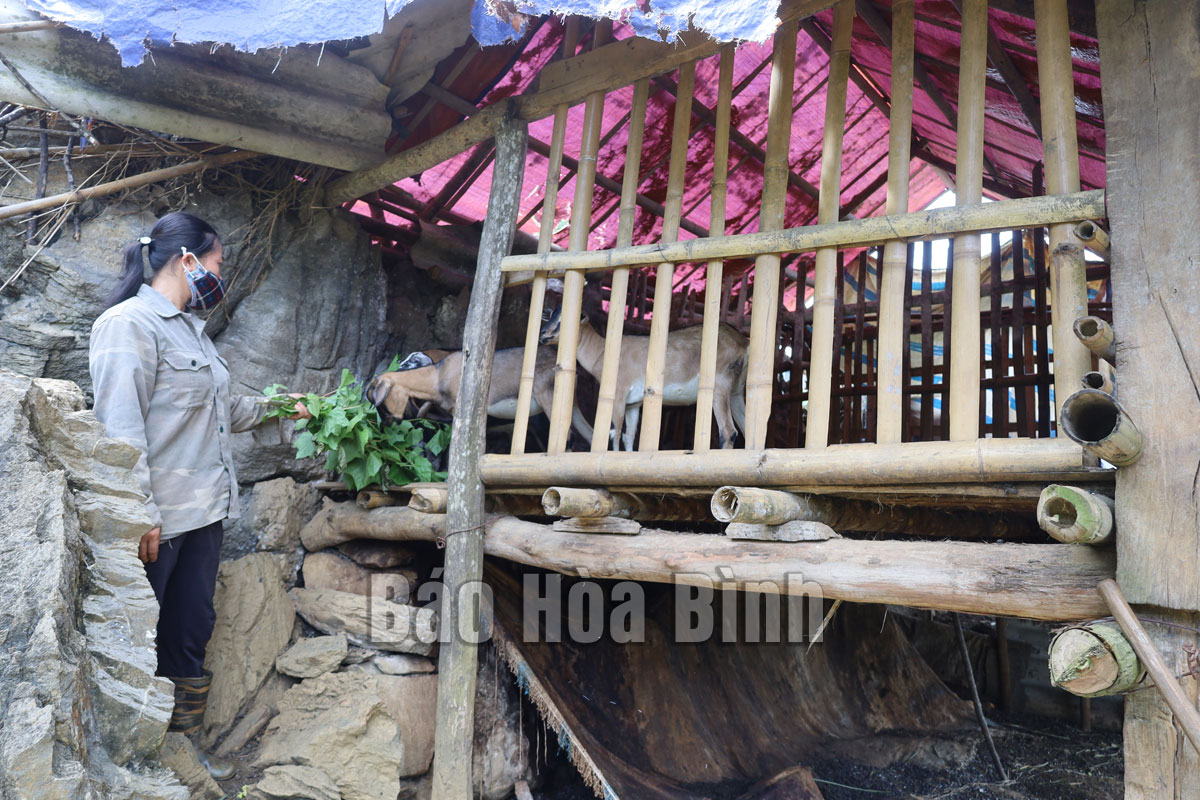
(HBO) - Le Chi Huyen, Vice Chairman of the Tan Lac District People's Committee, said that after the 2016-2020 period, projects that aim to support production development, diversify livelihoods and multiply sustainable poverty reduction models in extremely difficult communes in Tan Lac district still maintain effectiveness. Supporting activities from the project have gradually improved people's lives and incomes, along with other poverty reduction policies.
By the end of 2021, the poverty rate of the district decreased
to 8.69% and its per capita income hit 50 million VND (about 2,000 USD) per
year.
Households in
Tham hamlet in Tan Lac district’s Suoi Hoa commune escape poverty thanks to the
multiplying of sustainable poverty reduction models.
In the past, Dinh Cong Nhiem'sfamily in Buong hamlet, Quyet Chien
commune, suffered difficulties and had to rely on the Government's support.
However, their hardship has been lessened after joining a livelihood
diversification model. Especially, he was provided with young chayote trees,
fertilisers and techniques for taking care of the trees.
In addition to earning from growing chayotes, he also engages in breeding
livestock to raise income, thus, his family is no longer on the list of poor
households.
Suoi Hoa commune once had 25 poor and near-poor households benefiting from the
project of multiplying the sustainable poverty model.
Bui Thi Thuy, from Tham hamlet, said that as one of the households
participating in the model, her family was provided with three breeding goats.
After five years, her goat herd reach hundreds of heads. With accumulated
capital from selling goats, Thuy also raised chickens and pigs, thereby, her
family now enjoys a stable income.
By the end of 2020, only five communes in the district have a poverty rate of
over 20% while eight communes and towns have a poverty rate of less than 10%
while three communes have a rate of less than 15%. The results are attributed
to the implementation of support production development and diversify
livelihood and multiplying of sustainable poverty reduction models in extremely
difficult communes as well as those that are included in Programme 30a and
Programme 135.
The total capital for supporting production in extremely
difficult communes was estimated at over 18.5 billion VND.
The district is focusing on carrying out the plans for 2022 and
the 2022 – 2025 period. It is also reviewing the number of poor and near-poor
households this year and those with average living standards.
Along with investing in upgrading infrastructure at extremely difficult
communes, the district will continue to implement projects to support
production, diversify livelihoods, and multiply poverty reduction models, thus
contributing to realising poverty reduction targets in beneficiary communes and
hamlets./.
More than just an information technology teacher, Bui Van Nien is an inspiring figure who has nurtured the scientific curiosity and creative spirit of students in Vietnam’s ethnic minority communities.
Da Bac is the most disadvantaged mountainous district in Hoa Binh province, with ethnic minorities accounting for about 90% of its population. Over the past years, the district has mobilised resources to implement ethnic policies to improve the quality of life of local people.
In recent years, Hoa Binh province has consistently prioritised the protection, care, and education of children, particularly those from ethnic minorities and disadvantaged backgrounds, by creating a safe, healthy, and nurturing environment for their all-round development.
The Steering Committee for Tobacco Harm Prevention and Control of Hoa Binh province, in coordination with the Tobacco Harm Prevention and Control Fund, held a ceremony on May 28 in response to the World No Tobacco Day (May 31) and the National No Tobacco Week (from May 25 to 31). The event was chaired by Nguyen Van Toan, Standing Vice Chairman of the provincial People’s Committee and head of the Steering Committee.
Since 2021, the Center for Industrial Promotion and Industrial Development Consulting (CIIDC) under the Department of Industry and Trade has been implementing a school lighting model as part of the plan for using energy efficiently and economically in Hoa Binh Province in the pẻiod of 2021 - 2025. This model not only aims to improve the learning conditions and enhance the education quality, but it also promotes the message of energy saving, energy security, environmental protection and contributes to the goals of socio-economic development.
In the 2024 - 2025 school year, the entire Hoa Binh provincial education sector includes 520 educational institutions and schools. Among them are 13 ethnic boarding schools with 153 classes and 4,487 students. Four of these schools have met national standards, reaching 30.7 percent.



